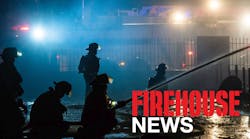During the last several years, the U.S. government has changed the manner in which grants are applied for, awarded and evaluated. This system has become known as “performance grants” to eliminate wasteful spending through accountability and to recognize those agencies that are implementing and producing the results that they stated they would achieve, if awarded funding. The result is an arduous, involved process for public safety agencies in applying for these grants. These changes in the national grant-writing system makes it more important than ever for volunteer fire departments to take advantage of free grant programs available to them and to take it upon themselves to learn more about the procedures involved in obtaining critical grant funding.
Properly researching and writing a grant is a time-consuming process and public safety professionals’ primary responsibility is the protection of and service to their citizens. By following these tips and taking advantage of free consultation programs, the grant-writing process can be more effective, more productive, and most importantly, more successful.
Getting Started
- If you read no other tip on this page, read this one: DON’T GIVE UP! The grant process can be frustrating, but it is doable.
- “No” does not mean “never.” Most grant writers are rejected more times than they ever get funded. A squeaky wheel eventually gets oiled, and persistence and practice make a successful grant writer.
- Many grants are rejected simply because the funding source ran out of money. There’s always next year and there’s always another grant. Review, revise, update and resubmit it or send it to a grant-writing consultant to help you. This is a great timesaver.
What is Eligible?
- Eligible activities change. Activities that may not have been funded in previous years may be allowed this year. Review your past unsuccessful grants to see if those activities may now be eligible.
- Grant funding can be used for some administrative costs, depending on the grant and its rules of use. You may be able to use the grant to cover costs of administering the grant.
- Deadlines show no mercy. If your application is not in by the deadline, it’s not being considered, period.
- Does your department have a DUNS number? If not, stop reading and get a DUNS number now: All federal grantees MUST obtain a DUNS number (a unique nine-character identification number provided by the commercial company Dun & Bradstreet). Additional information about DUNS numbers can be found on the Dun & Bradstreet website at www.dnb.com/us. You can also apply by telephone at 800-333-0505.
- If you’re trying to set up a training program, set your goals high. Instructor-led, hands-on training programs that lead to a national certification can give your application higher scores in these areas.
- Drive home a different equipment focus. Vehicles are the most frequently requested grant item. Keep this in mind in deciding your program priorities.
- Start getting familiar with the National Incident Management System (NIMS). Departments receiving or applying for federal grant programs from the Federal Emergency Management Agency (FEMA), Department of Homeland Security monies, etc., have been mandated by Homeland Security Presidential Directive 5 (HSPD-5) to “adopt” or “be in compliance” with NIMS by fiscal year 2005. Further information on NIMS can be obtained through the NIMS Integration Center at http://www.fema.gov/nims/.
Writing Tips
- Keep it clear, keep it simple and keep it right. Remember and apply the KISS principle (keep it simple, stupid) when writing your applications. Be clear, concise and accurate.
- Those who fail to prepare, should be prepared to fail. Before a grant-application period opens, gather information. Where could your department best use the money? How has a lack of funding affected your department’s ability to respond, train and operate? Work on these issues now, and when the application period opens you’ll be ready.
- Type your application and narrative in any word processing software. This lets you “draft” and revise many times, and lets others read and proofread your application prior to you submitting it.
- Use the Internet to make the application process easier. More and more grants are using the Internet to make the grant-application process easier. The now-complete 2004 AFGP grant application was a great example: you could take a tutorial on its “e-grant” process, save and update your application as needed, and send electronically once complete.
The reality is that your budget is tight and your tax bases are shrinking. Available funding must be used to improve the economic conditions of our first responders first. You want better equipment for your staff and they need that equipment so they can do a better job, for the citizens they tirelessly protect. Grants are available to you and you deserve them. All you need to do is remember these important tips, and enlist the support of a free grant-writing consultant who can steer you in the right direction. Good luck!
Kurt Bradley is the grants-writing consultant at CHIEF. His experience spans more than 26 years of public safety and grant-writing experience, and has attained certification with the National Grant Writers Association. Bradley is a former lieutenant with the Lake Alfred, FL, Police Department, where he was the commander of the communications and criminal investigations division for his department, as well as its grant writer. Upon retiring from law enforcement, he wrote grants for the City of Lakeland Housing Authority, as well as for corporate and private foundations for social service programs. He is happy to answer any questions; contact him at [email protected]. Visit www.chiefgrants.com to quickly locate federal-government grant opportunities that are currently open and available, as well as to grant training, research, tips and frequently asked questions.




